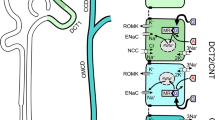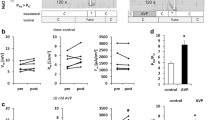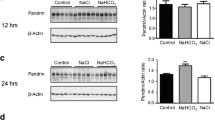Abstract
In order to examine the nature and potential mechanisms of action of extracellular sodium on human proximal tubule growth and transport, quiescent primary cultures of human proximal tubule cells (PTC) were incubated for 24 h in serum-free, growth-factor-free culture media containing low (130 mmol/l), control (140 mmol/l) or high (150 mmol/l) Na+. Compared to control conditions, cells exposed to a high Na+ concentration demonstrated stimulated thymidine incorporation (121.8 ± 7.6%, P < 0.05) and increased cellular protein content (139.7 ± 9.9%, P < 0.05); the latter arising from suppressed protein degradation ([3H]valine release 72.3 ± 2.5%, P < 0.01) and unchanged protein synthesis ([3H]valine incorporation 98.5 ± 2.6%, P > 0.1). Substitution of choline chloride for NaCl did not replicate these effects. Conversely, cells incubated in low-Na+ media showed reduced thymidine incorporation (77.2 ± 4.4%, P < 0.05), reduced protein synthesis (60.6 ± 4.3%, P < 0.01), reduced protein degradation (79.5 ± 1.8%, P < 0.01) and an unaltered protein content (102.4 ± 8.8%). A role for apical Na+/H+ exchange (NHE) activity in mediating Na+-dependent alterations in PTC growth was suggested by the findings of increased apical, ethylisopropylamiloride- (EIPA)-sensitive 22Na+ uptake in the presence of a high Na+ concentration (159 ± 19% of control, P < 0.05) and concentration-dependent inhibition of cellular growth by EIPA at levels corresponding to those producing inhibition of apical NHE. Conditioned media from low Na+, control or high Na+ PTC contained comparable amounts of platelet-derived growth factor-AB (1.19 ± 0.23, 1.14 ± 0.22 and 1.28 ± 0.20 ng/mg protein, P > 0.1) and transforming growth factor-β1 (1.76 ± 0.32, 1.73 ± 0.33 and 1.45 ± 0.28 ng/mg protein, P > 0.1), and did not exhibit autocrine growth factor activity on separate PTC following adjustment of Na+ concentrations to 140 mmol/l by dialysis. Similarly, low-Na+, control or high-Na+ media did not modify the mitogenic responsiveness of PTC to insulin-like growth factor-I (IGF-I) or alter the affinity or number of PTC IGF-I binding sites. The results confirm that physiological increases in extracellular Na+ concentration directly stimulate human proximal tubule growth and Na+ transport. Such stimulation does not appear to be mediated by altered PTC secretion of, or responsiveness to, cytokines known to affect tubule growth and transport.
Similar content being viewed by others
Author information
Authors and Affiliations
Additional information
Received: 12 May 1997 / Received after revision: 10 August 1997 / Accepted: 26 August 1997
Rights and permissions
About this article
Cite this article
Johnson, D., Saunders, H., Poronnik, P. et al. Physiological changes in extracellular sodium directly control human proximal tubule growth and transport. Pflügers Arch 435, 211–218 (1997). https://doi.org/10.1007/s004240050503
Issue Date:
DOI: https://doi.org/10.1007/s004240050503




